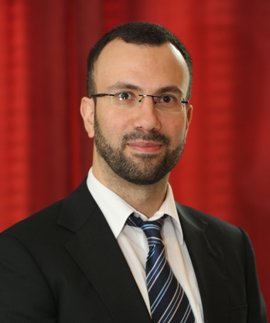The working of the Centre for Arab Genomic Studies is highlighted during Arab Health Exhibition & Congress 2014
29 January 2014
The 2nd Big Data Conference discussed the processes carried out by the Hamdan Medical Award’s Centre for Arab Genomic Studies (CAGS) to accumulate, analyze and publish its enormous reservoir of genetic data. The 2nd Big Data Conference is held under the umbrella of the 39th edition of Dubai’s Arab Health exhibition & Congress, from 28th till 29th of January at the Dubai International Convention and Exhibition Centre.
During the 2nd Big Data conference, the Senior Scientific Coordinator at CAGS; Dr. Abdul Rezzak Hamzeh delivered a lecture entitled "Sharing health information across borders: Arab Genetic Centre case study".
“I spoke about the strategy pursued by CAGS in order to manage data contained within the Catalogue for Transmission genetics in Arabs database (CTGA). The latter has become a major reference point for genetic data worldwide in a relatively short period of time. The eminence of CTGA stems from its uniqueness in addition to being completely open-access and continuously updated.” Dr. Hamzeh said.
“Since the establishment of CAGS in 2003 in accordance with the directives of H.H. Sheikh Hamdan bin Rashid Al Maktoum, Deputy Ruler of Dubai, UAE Minister of Finance and the patron of Hamdan Medical Award, the systematic approach to manage the database ensures meeting the requirements of growing numbers of users from all around the world. This serves to reinforce the leading role of CAGS in disseminating genetic information among geneticists and doctors across borders. In fact, the results of CAGS’ work are continuously affecting healthcare provision nationally and regionally through contributing to the advancement of prevention, diagnosis and treatment of genetic disorders”, he added.
“The number of genetic diseases listed in the CTGA database have exceeded 1600, and this data has been collected from 23 Arab countries including the United Arab Emirates , Saudi Arabia, Qatar, Bahrain , Oman, Kuwait , Yemen, Iraq , Syria, Jordan , Lebanon, Palestine , Egypt, Libya , Tunisia, Morocco , Algeria, Sudan , Mauritania, Djibouti, Eritrea, Comoros and Somalia”, he said.
“CAGS is keen on exchanging data with the largest possible number of specialists in the field of human genetics, through organizing and participating in a number of continuous medical education programs, such as conferences and workshops, which effectively contribute to bridging the gap between researchers and practitioners working in the health sector”, he added.
“One of these important events is the Pan Arab Human Genetics Conference, which is organized by CAGS every two years with the participation of hundreds of geneticists, doctors and students from many countries around the world. The conference has become an important platform for exchanging information and giving the chance to announce new innovative insights which help to enrich this field of medicine”, he said.
“CAGS promotes genetic literacy among non-specialists through publishing the series of booklets entitled “Genetics made easy”, as well as participating in many awareness campaigns. This is an important method to prevent and reduce the spread of the genetic diseases in Arab societies”, Dr. Abdul Rezzek Hamzeh pointed out.
It is worth mentioning that the Arab Health Exhibition and Conference is one of the most important medical events in the Middle East and North Africa. 3,900 companies from 64 countries participate in this year’s event. Also, 91 specialized conferences on many health care topics are held within the event.

